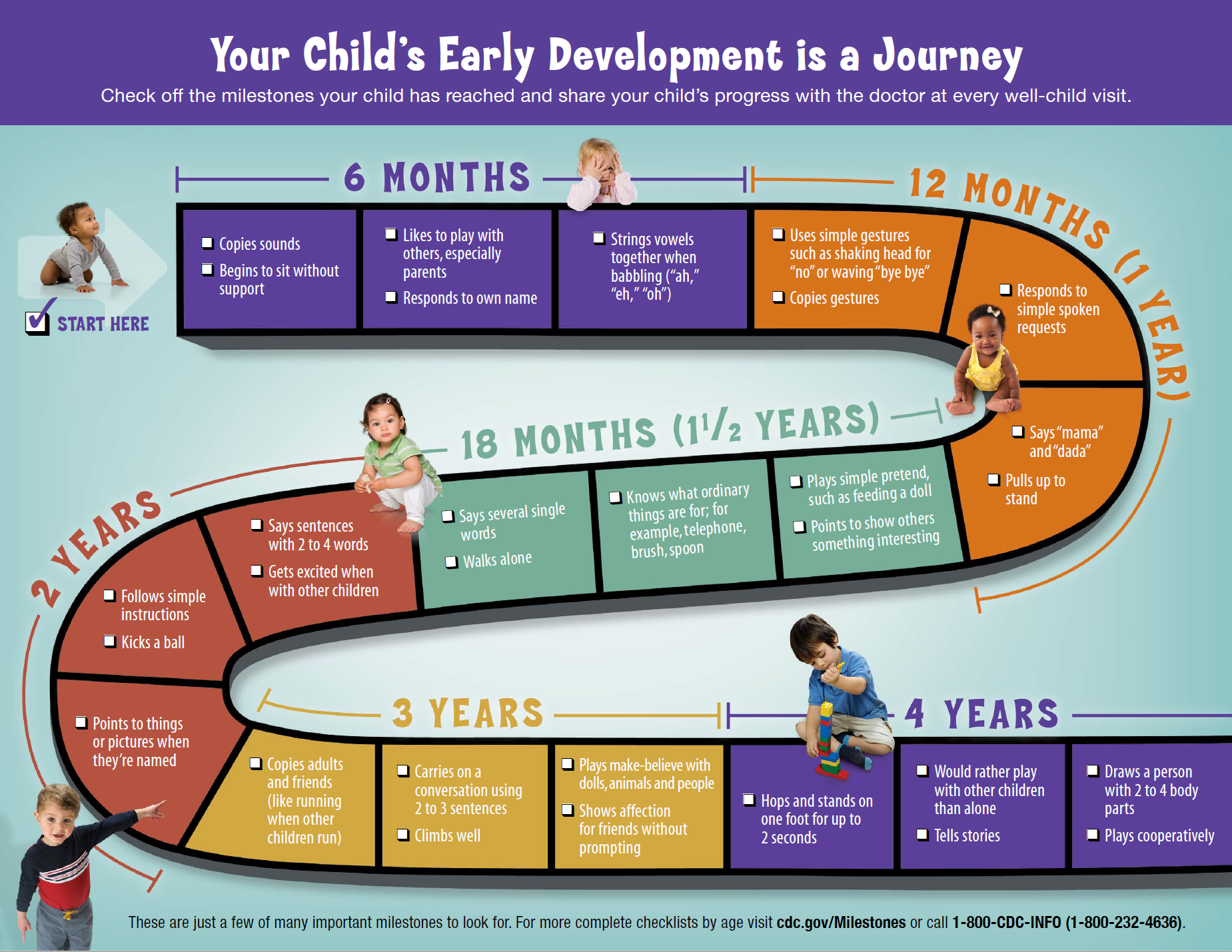
Parent Infant Education Program (PIE)
The Infant & Toddler Connection of Alexandria/Parent Infant Education (PIE) Program
The PIE Program provides early intervention supports and services to infants and toddlers who are not developing as expected or who have a medical condition that can delay normal development. Early intervention supports and services are available for all eligible children birth through age two and their families regardless of the family’s ability to pay. The PIE program is part of the statewide early intervention program known as the Infant & Toddler Connection of Virginia. Services offered include service coordination, developmental therapy, occupational therapy, physical therapy, social work services, speech therapy and vision services.
The image below outlines milestones from birth through age four; PIE's early intervention supports and services are available for eligible children from birth through age two.

What is Early Intervention?
If you or your pediatrician have any concerns about your infant’s or toddler’s development, it is important to get extra help as early as possible. PIE provides support and services so that families can help their children learn during everyday activities and routines. Starting early can have a significant impact on a child’s ability to learn new skills and overcome challenges and can increase success in school and life. This is referred to as “early intervention.”
Who is eligible?
A child may be eligible for early intervention if they are developing differently or more slowly than other children or have a health condition that will affect development. Your service coordinator will gather the information and people needed to determine if your child is eligible. Early Intervention services are available for eligible children until their third birthday.
How do I find out if my child is eligible?
Call 703.746.3363. Staff will ask for basic information, answer your questions and set up an appointment for you and your child to meet with a service coordinator, or you may get a call back to make this appointment. If your doctor or another community person contacts us on your behalf, staff will call you to talk about early intervention, ask you some questions, answer your questions and set up a time for a service coordinator to meet you and your child.
Typically, early intervention services are provided in the home or community, but during the pandemic, PIE’s programs are being offered primarily through telehealth platforms (see more information below).
What can I expect from early intervention services?
Your service coordinator and a team of professionals will work with you to develop a plan based on your child’s needs and what’s important to you. You and your team will decide how everyone will work together to reach your family goals. This plan is called the Individualized Family Service Plan, or IFSP.
Research shows that children learn best during everyday activities. That’s why services are provided where your child lives, learns and plays. Typically, this can be your home, child care and other places your family spends time; during the pandemic, PIE’s programs are being offered primarily through telehealth platforms (see more information below).
Children learn best from you and the other important people in their lives. Service providers focus on helping you and your child’s other caregivers understand how to help your child learn during daily routines and activities. This is referred to as coaching, and it requires you to be an active partner with the service provider.
What is Caregiver Coaching?
Caregiver coaching is an evidence-based service delivery approach utilized by PIE. Through coaching, service providers assist parents and other caregivers in identifying and using intervention strategies to help their child develop and learn during everyday routines and activities. Whether in person or via telehealth, coaching works well and the child benefits from the services even when the therapist isn’t physically present with the family.
What is telehealth?
PIE’s programs are being offered primarily through virtual platforms, like video or telephone calls. Using this approach, many children have been able to achieve their goals. While virtual services may not work for every family, many families like telehealth and have commented on how empowered it has made them feel. If your child is experiencing a developmental delay we encourage you to give early intervention a try. If you do not feel that progress is being made, a referral can be made to other services that may better fit your needs.
What do telehealth services look like?
Watch the videos below to learn more about what telehealth services look like for physical therapy, occupational therapy and speech-language therapy.
- A Home Visit with Zander's Family video
- A Home Visit with Sam's Family video
- A Home Visit with Ares' Family video
How much will early intervention cost?
Some services are provided at no cost to the family. These include service coordination, determining eligibility, any testing that is needed, and writing an Individualized Family Service Plan (IFSP). There are fees for some services listed on the IFSP, but your family cannot be denied services if you can’t afford them.
Resources
- What is Early Intervention? in English and Spanish
- CDC Milestones Brochure in English
- Developmental Disability Services for adults
- A Parent's Guide to Services: Securing a Future for Your Child With Disabilities
- If you reside outside of Alexandria, consult the Infant & Toddler Connection of Virginia Directory for services in other Virginia cities and counties